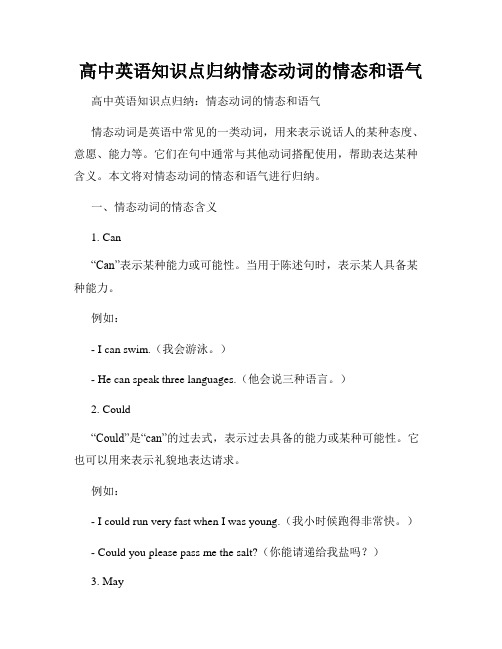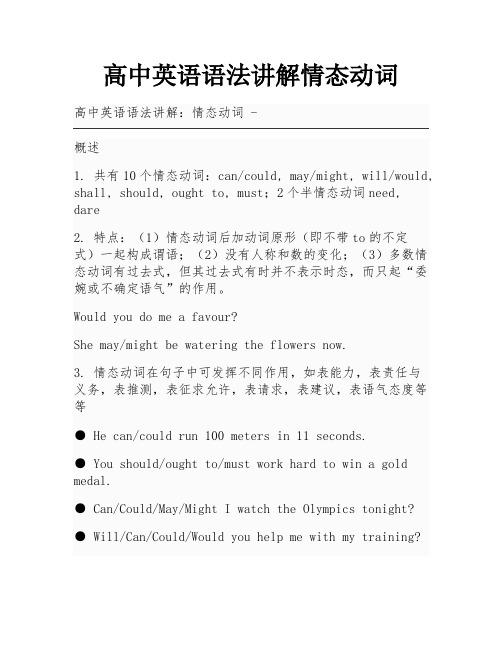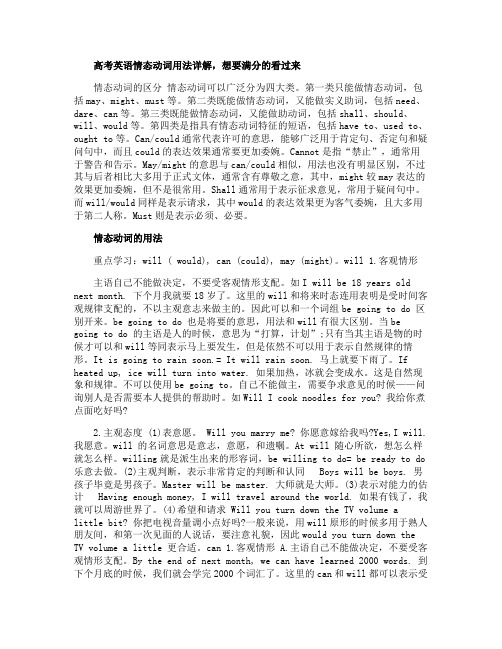高考英语情态动词讲解
高中英语知识点归纳情态动词的情态和语气

高中英语知识点归纳情态动词的情态和语气高中英语知识点归纳:情态动词的情态和语气情态动词是英语中常见的一类动词,用来表示说话人的某种态度、意愿、能力等。
它们在句中通常与其他动词搭配使用,帮助表达某种含义。
本文将对情态动词的情态和语气进行归纳。
一、情态动词的情态含义1. Can“Can”表示某种能力或可能性。
当用于陈述句时,表示某人具备某种能力。
例如:- I can swim.(我会游泳。
)- He can speak three languages.(他会说三种语言。
)2. Could“Could”是“can”的过去式,表示过去具备的能力或某种可能性。
它也可以用来表示礼貌地表达请求。
例如:- I could run very fast when I was young.(我小时候跑得非常快。
)- Could you please pass me the salt?(你能请递给我盐吗?)3. May“May”用于表示允许、请求或推测。
例如:- You may go now.(你现在可以走了。
)- May I borrow your pen?(我可以借用你的钢笔吗?)- She may be at home.(她可能在家。
)4. Might“Might”是“may”的过去式,表示过去某种猜测、推测或可能性。
例如:- He might have forgotten the appointment.(他可能忘记了约定。
)- It might rain later.(说不定一会儿会下雨。
)5. Must“Must”表示一种推测或强烈的命令。
例如:- It must be cold outside.(外面肯定很冷。
)- You must finish your homework before going out.(出去之前你必须完成作业。
)6. Shall“Shall”常用于疑问句中,表示征求对方的意见或提出建议。
情态动词高中知识点高三

情态动词高中知识点高三情态动词是一类具有特殊意义和用法的动词,它们在句子中一般与实义动词连用,表示说话人的推测、命令、请求、建议等情态。
在高中英语学习中,掌握情态动词的正确用法至关重要。
本文将介绍情态动词的相关知识点,帮助高三学生更好地运用这一语法现象。
一、情态动词的定义情态动词,又称情态助动词,是用来表示说话人对某种动作或状态的态度、推测、可能性、能力、意愿、义务等情态的一类特殊动词。
常见的情态动词包括can、could、may、might、must、shall、should、will、would等。
二、情态动词的用法1. 表示能力情态动词can表示某人具有能力或可能做某事,could用于过去说法。
例如:- She can speak three languages fluently.(她能说流利的三种语言)- He could lift the heavy boxes when he was younger.(他年轻时能搬起这些沉重的箱子)2. 表示推测和可能性情态动词may、might、could用于表示推测和可能性。
may用于表示较为肯定的推测,might和could表示推测的可能性较小。
例如:- The weather is cloudy, it may rain later.(天气多云,可能会下雨)- He might be late for the meeting.(他可能会迟到会议)3. 表示义务和建议情态动词must表示说话人对某种行为具有强烈的责任感或坚决要求,should表示建议。
例如:- We must obey the laws of the country.(我们必须遵守国家的法律)- You should apologize to your friend for your mistake.(你应该为你的错误向朋友道歉)4. 表示许可和请求情态动词can、may、could用于表示允许和请求。
情态动词知识点总结高中

情态动词知识点总结高中情态动词是英语中一个重要的语法现象,它们能够表达说话者的情感、态度、意愿等,以及表达说话者对事件的推测、猜测、可能性等。
了解情态动词的用法,能够帮助我们更准确地表达自己的意思,也有助于我们理解他人的意图。
本文将对情态动词的概念、用法、以及常见的情态动词进行总结和归纳,以便于读者更深入地理解情态动词的使用。
一、情态动词的概念情态动词(Modal Verb)是一类特殊的助动词,用来表示说话者的情感、态度、意愿等,以及表达说话者对事件的推测、猜测、可能性等。
情态动词通常用于句子的前面,后面跟动词原形,用来构成不同的语法结构和表达不同的含义。
英语中常见的情态动词有can、could、may、might、must、shall、should、will、would、ought to等。
这些情态动词具有一些共同的特点,比如不能独立完成谓语,后面必须跟动词原形;在疑问句和否定句中,情态动词的位置要发生变化等。
二、情态动词的用法1. 表示能力和可能性can与could表示说话者的能力或者对某种事情的可能性,其中can用于现在时,could用于过去时。
比如:I can speak Spanish.(我会说西班牙语。
)She could swim when she was five.(她五岁的时候就会游泳。
)may与might也表示可能性,may 用于现在时,might 用于过去时。
比如:It may rain tomorrow.(明天可能会下雨。
)I thought she might come.(我以为她可能会来。
)2. 表示请求和建议will与would可以表示请求,will用于肯定句,would用于否定句和疑问句。
比如:Will you please help me?(你能帮帮我吗?)I would like to go with you.(我想和你一起去。
)shall与should也可以表示请求或者建议,should更多地表示建议。
高中英语语法讲解情态动词

高中英语语法讲解情态动词概述1. 共有10个情态动词:can/could, may/might, will/would, shall, should, ought to, must;2个半情态动词need,dare2. 特点:(1)情态动词后加动词原形(即不带to的不定式)一起构成谓语;(2)没有人称和数的变化;(3)多数情态动词有过去式,但其过去式有时并不表示时态,而只起“委婉或不确定语气”的作用。
Would you do me a favour?She may/might be watering the flowers now.3. 情态动词在句子中可发挥不同作用,如表能力,表责任与义务,表推测,表征求允许,表请求,表建议,表语气态度等等● He can/could run 100 meters in 11 seconds.● You should/ought to/must work hard to win a gold medal.● Can/Could/May/Might I watch the Olympics tonight?● Will/Can/Could/Would you help me with my training?● He might/may/could/should/ought to/will/must watch the football match tonight.● I suggest that you should watch the opening ceremony.● Can this be true?4. (1)情态动词+do 表对一般现在或将来情况的推测(2)情态动词+ be doing 表对正在发生的事情的推测(3)情态动词+have done 表对过去已经发生的事情的推测● 常见“情态动词+have done”归纳1. could have done 过去本有能力做某事但没做(虚拟)2. may/might have done ①过去可能已经做了某事(推测)②过去本可能做某事但没做(虚拟)(责备)3. must have done过去一定已经做了某事(推测)4. can't/couldn't have done过去不可能已经做了某事(推测)5. should/ ought to have done ①过去应该已经做了某事(推测)②过去本应该做某事但没做(虚拟)(责备)6. shouldn't/ oughtn't to have done 过去本不应该做某事但做了(虚拟)(责备)7. needn't have done 过去本不必做某事但做了(虚拟)例句1) You could have got a full mark, but you were to careless.2) She may have missed the first train in the morning.3) You may have hurt yourself when climbing the tree.4) You must have stayed up late last night.5) It can't/couldn't have rained last night, for the streets are dry.6) They should have arrived in Beijing by this time.7) You should have e to the meeting earlier.8) You shouldn't have told Mary the sad truth.9) You needn't have taken a taxi here, for it was near my house.一、can/could 的用法3. 固定用法:(1) can not/never…too/enough “再怎么…也不过分,越…越好”● I can never thank you enough.● You can't be too careful.● You can never remember too many words.(2) can't + 比较级“不能更...,非常...”● I can't agree more.● The film couldn't be more boring(3) cannot but do sth. 不得不,只好● I cannot but admire your bravery.(4) can't help doing sth 情不自禁做; can't help (to) do sth 不能帮忙做二、may/might的用法3.may表示祝愿或希望。
高考英语情态动词用法详解

高考英语情态动词用法详解,想要满分的看过来情态动词的区分情态动词可以广泛分为四大类。
第一类只能做情态动词,包括may、might、must等。
第二类既能做情态动词,又能做实义助词,包括need、dare、can等。
第三类既能做情态动词,又能做助动词,包括shall、should、will、would等。
第四类是指具有情态动词特征的短语,包括have to、used to、ought to等。
Can/could通常代表许可的意思,能够广泛用于肯定句、否定句和疑问句中,而且could的表达效果通常要更加委婉。
Cannot是指“禁止”,通常用于警告和告示。
May/might的意思与can/could相似,用法也没有明显区别,不过其与后者相比大多用于正式文体,通常含有尊敬之意,其中,might较may表达的效果更加委婉,但不是很常用。
Shall通常用于表示征求意见,常用于疑问句中。
而will/would同样是表示请求,其中would的表达效果更为客气委婉,且大多用于第二人称。
Must则是表示必须、必要。
情态动词的用法重点学习:will ( would), can (could), may (might)。
will 1.客观情形主语自己不能做决定,不要受客观情形支配。
如I will be 18 years old next month. 下个月我就要18岁了。
这里的will和将来时态连用表明是受时间客观规律支配的,不以主观意志来做主的。
因此可以和一个词组be going to do 区别开来。
be going to do 也是将要的意思,用法和will有很大区别。
当be going to do 的主语是人的时候,意思为“打算,计划”;只有当其主语是物的时候才可以和will等同表示马上要发生,但是依然不可以用于表示自然规律的情形。
It is going to rain soon.= It will rain soon. 马上就要下雨了。
高考英语情态动词解析

高考英语情态动词解析情态动词的全称是情态助动词,助动词则分为两种:差不多助动词和情态助动词。
什么缘故要细分一下呢?因为它们是有区别的:差不多助动词有三个:be, have, do情态动词有大约14个:may, might; can, could; will, would; shall, sh ould;must, need, dare, used to, ought to. had better构成时态或语态的助动词,提早或否定时显现的动词。
换句话说确实是:助动词是当形式需要它的时候才显现,不该它显现就哪儿凉快哪儿呆着。
比如由于时态或语态的要求,比如疑问句或否定句的要求等等,需要它的时候才显现,不需要的时候并没它们什么事。
它们的区别:1、每个情态动词都有差不多意义,差不多助动词则没有,只具有语法作用。
2、情态动词后面接原形动词,也确实是秃头不定式;助动词要看时态或语态等等情形变化。
3、情态动词没有人称和数的变化,而助动词则有。
4、只有现在和过去两种形式,但能够表示过去、现在和今后时刻。
5、情态动词没有非谓语动词形式,而助动词有。
巩固练习:1、____ you understand the different kinds of English these people are using?A. WillB. CanC. May2、You ____ be Carol. You haven’t changed a bit after all these ye ars.A. mustB. mightC. should3、—I think I’ll give Bob a ring.—You ____. You haven’t been in touch with him for ages.A. willB. mayC. should4、Although you ____ find bargains in London, it’s not generally a cheap place to shop.A. shouldB. needC. can5、It is usually warm in my hometown in March, but it ____ be rat her cold sometimes.A. mightB. canC. must6、If you ____ go, at least wait until the storm is over.A. shouldB. mustC. may7、—What are you going to do this Saturday?—I’m not sure, but I ____ go tothe Rolling Stone concert.A. mayB. mustC. can8、One of our rules is that every student ____ wear school uniform while at school.A. shallB. needC. may9、—I’ve prepared all kinds of food for the picnic.—Do you mean we ____ bring anything with us?A. can’tB. mustn’tC. needn’t10、Days later, my brother called to say he was all right, but ___ no t say where he was.A. wouldB. mayC. can情态动词习题解析巩固练习:1、____ you understand the different kinds of English these people are using?A. WillB.CanC. May2、You ____ be Carol. You haven’t changed a bit after all these ye ars.A.mustB. mightC. should3、—I think I’ll give Bob a ring.—You ____. You haven’t been in touch with him for ages.A. willB. mayC.should4、Although you ____ find bargains in London, it’s not generally a cheap place to shop.A. shouldB. needC.can5、It is usually warm in my hometown in March, but it ____ be rat her cold sometimes.A. mightB.canC. must6、If you ____ go, at least wait until the storm is over.A. shouldB.mustC. may7、—What are you going to do this Saturday?—I’m not sure, but I ____ go to the Rolling Stone concer t.A.mayB. mustC. can8、One of our rules is that every student ____ wear school uniform while at school.A.shallB. needC. may9、—I’ve prepared all kinds of food for the picnic.—Do you mean we ____ bring anything with us?A. can’tB. mustn’tC.needn’t10、Days later, my brother called to say he was all right, but ___ no t say where he was.A.wouldB. mayC. can。
高考英语练习 情态动词和虚拟语气(讲解部分)
与将来事 实相反
①过去式 ②should+动词原形 ③were to+动词原形
would/should/could/ might+动词原形
If he shouldn't come tomorrow, we would put off the meeting.如果他明天不 来,我们就推迟这个会议。
周末给她打电话。
may,might 表示推测,用于肯定句,意为 “可能”,may not意为“可能不”, 如表 达“不可能”则用can't
This coat may be Peter's.这件大衣可能是彼得的。 This coat may not be Peter's.这件大衣可能不是彼得的。
may表示祝愿
表示理论上的可能时可用于肯定句。could表 Accidents can happen in this weather. 这种天气可
示推测时比can可能性小,可用于肯定句、否定 能会发生事故。(理论上的可能性)
句和疑问句
It could be weeks before we get a reply. 我们可能
2.用于“(should+)动词原形”结构的虚拟语气 (1)用于宾语从句中 以下动词后的宾语从句常常使用虚拟语气,即谓语为“(should+)动词原 形”。
6.will,would
用法
例句
用于各种人称,表示主语的意愿和意志
He will/would take you home.他愿意送你回家。
与第二人称的一般疑问句连用,表示请求、建议 Will/Would you go with me?你愿意和我一起去 吗?
高考英语情态动词用法归纳
情态动词用法归纳情态动词有can (could), may (might), must, have to, shall (should), will (would), dare (dared), need (needed), ought to等。
情态动词无人称和数的变化;不能单独使用,必须与其后的动词原形构成谓语一、can, could1) 表示能力(体力、知识、技能)。
Can you lift this heavy box?(体力)Mary can speak three languages.(知识)Can you skate?(技能)此时可用be able to代替。
Can只有一般现在时和一般过去式;而be able to则有更多的时态。
I'll not be able to come this afternoon.当表示"经过努力才得以做成功某事"时应用be able to,不能用Can。
如:He was able to go to the party yesterday evening in spite of the heavy rain.2) 表示请求和允许。
-----Can I go now?----- Yes, you can. / No, you can't.此时可与may互换。
在疑问句中还可用could, might代替,不是过去式,只是语气更委婉,不能用于肯定句和答语中。
---- Could I come to see you tomorrow?---- Yes, you can. ( No, I'm afraid not. )3) 表示客观可能性(客观原因形成的能力)。
They've changed the timetable, so we can go by bus instead.This hall can hold 500 people at least.4) 表示推测(惊讶、怀疑、不相信的态度),用于疑问句、否定句和感叹句中。
(完整版)高考情态动词讲解
语法专题(三)情态动词考点归纳考点一:情态动词表示能力1.表现在的或一般的能力:表示现在的或一般的能力用can或be able to,can 比be able to 使用得更普遍。
can 侧重指有能力做某事;而be able to更强调通过努力、克服困难做成某事。
A computer can't think for itself ;it must be told what to do.He is a native speaker of English,so he can of course speak English quite well.2.表示将来的能力:表示将来能力用will be able to。
If you have a good sleep,you will be able to work out this problem.如果你睡个好觉,你就能做出这道题。
3.表示过去的能力:could 表示过去一般的能力,即不表示做或未做某事;而was (were) able to do则表示过去有能力并且成功地做了某事,相当于managed to do something/succeeded in doing somethin。
g考点二:情态动词表示推测(可能性)可能性可分为客观的(理论的)可能性和具体事情实际发生的可能性。
1.客观的(理论的)可能性指并不涉及具体某事是否会发生,此种用法常常可以说明人或事物的特征。
can 用于肯定句中表示客观的(理论的)可能性,can用于疑问及否定句中则表示实际发生的可能性。
The World Wide Web is sometimes jokingly called the World Wide Wait because it can be very slow.A left- luggage office is a place where bags can be left for a short time,especially in a railway station.2.表示具体事情实际发生的可能性:表示具体事情实际发生的可能性的这些词后接动词原形是对现在事情的推测,后接完成式则表示对过去事情的推测;其中can,may/might,should,ought to,must 有时还可接进行时表示对现在正在进行的事情的推测。
高中英语语法之情态动词
高中英语语法之情态动词一、概念情态动词是表示能力,义务,必须,猜测等说话人的语气或情态的动词。
二、相关知识点精讲1.can1)表能力can 表能力时意味着凭体力或脑力或技术等可以无甚阻力地去做某事。
I can climb this pole.我能爬这根杆子。
He is only four , but he can read.他只有4岁,但已认得字了。
Fir e can’t destroy gold.火烧不毁金子。
因为 can 不能和其他助动词连用,所以表示将来式时用will be able to。
You will be able to skate after you have practiced it two or three times.你练习两三次后就会溜冰了。
2)表可能性多用于否定与疑问结构中,但也可用在肯定句中。
Can the news be true?这消息可能是真的吗?It can’t be true.它不可能是真的。
What can he possibly mean?他可能是什么意思?can 用在肯定句中表示理论上的可能性(一时的可能)。
Attending the ball can be very exciting.The road can be blocked.这条路可能会不通的。
may 在肯定句中表示现实的可能性。
The road may be blocked.这条路可能不通了。
3)表示允许(和 may 意思相近)常见于口语。
Can (May) I come in ?我能进来吗?Can I smoke here ?我可以在这里抽烟吗?2.could 的用法1)表过去的可能和许可,(多用于间接引语中)At that time we thought the story could not be true.那时我们认为所说的事不可能是真的。
Father said I could swim in the river.爸爸说我可以在河里游泳。
- 1、下载文档前请自行甄别文档内容的完整性,平台不提供额外的编辑、内容补充、找答案等附加服务。
- 2、"仅部分预览"的文档,不可在线预览部分如存在完整性等问题,可反馈申请退款(可完整预览的文档不适用该条件!)。
- 3、如文档侵犯您的权益,请联系客服反馈,我们会尽快为您处理(人工客服工作时间:9:00-18:30)。
高考英语情态动词讲解Newly compiled on November 23, 2020(一)情态动词常考点(一)表能力如:I am starving to death。
I can eat two bowls of rice now。
(现在的能力)我快饿死了,现在我能吃两碗米饭。
If you have a good sleep,you will be able to work out this problem。
(将来的能力)如果你好好睡一觉,你将能够解出这道题。
The fire spread through the hotel very quickly but everyone was able to get out。
(过去有能力做并且成功的做了某事)尽管这场大火迅速蔓延到了整个宾馆,但是每个人都能够逃出去。
I could have worked out the problem,but I didn’t。
(过去有能力做但未做)我本来可以解决这个问题,但没有解决。
(二)表推测(可能性)1.可能性可分为客观的可能性和具体事情实际发生的可能性两种。
所谓客观的(理论的)可能性即并不涉及具体某事是否会发生,此种用法常常可以说明人或事物的特征。
情态动词can可用于肯定句中表示客观的(理论的)可能性,而表示具体事情实际发生的可能性时,can一般不用于肯定句。
如:Accident can happen on such rainy days。
这样的多雨天气有可能会发生事故。
(客观的可能性)Peter may come with us tonight,but he isn’t sure yet。
彼得今晚可能和我们来,但他还没确定。
(实际可能性,不用can)2.表示具体事情实际发生的可能性:(1)表示具体事情实际发生的可能性的层次比较Mr. Bush is on time for everything。
How can it be that he was late for the opening ceremony(表示疑惑、惊讶)布什先生做每件事都很按时。
他怎么可能在开幕仪式上迟到呢I didn’t hear the phone。
I must have been asleep。
(表肯定)我没听到电话。
我肯定已经睡着了。
3.would,could,might并不一定与过去时间有关,而是表示可能性弱于他们相应的现在时形式。
另外should也不一定与过去时间有关。
如:This may/ might be done by him。
(后者比前者语气弱)这件事有可能是他干的。
4.should/ ought to表推测时,表示说话者有较大的试探性。
如:He ought to/ should be here on time—he started early enough。
他应该按时到这里——他出发的够早的。
We should arrive before dark。
我们按说能在天黑前到达。
The roads should be less crowded today。
今天路上应该不至于那么拥挤了。
(三)表请求、允许、允诺1.当对方是决策者时,你代表你(们)自己(I,we)或代表第三者(he,she,they)向对方(you)请示或提出建议时用:①Shall I(we)…②Shall he/ she/ they…③Would/ Will you…如:Shall we begin our classShall the driver wait outsideWhen shall my father be able to leave hospitalWould you do me a favor——您昨天晚上工作到很晚了吗——不是很晚,我没必要工作到很晚。
2.should也可以表示必要性,意为“(义务上)应该”。
should表必要性时,在语气上比must(必须)弱。
“should + 动词原形”表示现在或将来应该做某事(的必要性);“should + have + 过去分词”表示过去本该做某事(的必要性)。
如:I should go and visit him this afternoon,but I wonder if I will be free。
今天下午我应该去看望他,但我不知道我是否有空。
(表示将来的必要性)You should have come to the conference yesterday。
What was the reason for your absence你昨天应该参加那个会议。
你缺席的原因的是什么(表示过去的必要性)(五)“情态动词 + have done”用法一览表1.cannot but + do sth.表示“不得不,只好”。
如:I cannot but choose to go。
我只好去。
2.may well和may as well结构(1)“may well + 动词原形”是一种常用结构,意为“完全能,很可能”,相当于to be very likely to。
如:He may well be proud of his son。
他大可为儿子感到自豪。
Her appearance has changed so much that you may well not recognize her。
她的模样变化太大,你很可能认不出她了。
(2)“may/ might as well + 动词原形”意为“最好,满可以,倒不如”,相当于had better或to have no strong reason not to。
如:You may as well do it at once。
你最好马上就做这件事。
You may as well stay where we are。
我们留在现在的地方倒也不错。
3.can not(或never)等否定词与enough连用表示“再……也不为过”。
具体用法见形容词、副词专题。
4.may可以用于祈使句,表示祝愿。
如:May we never forget each other。
愿我们彼此永不相忘。
May you return in safety。
need和dare两者既可用作情态动词也可用作行为动词。
作行为动词时,有人称和数的变化,可用于肯定句、否定句或疑问句中,构成否定句或疑问句时要用助动词do,does,did;作情态动词时,没有人称和数的变化(dare可以有过去式dared),直接跟动词原形,只用于否定句和疑问句中,构成否定句和疑问句时不用助动词。
另外,dare作情态动词时,还可用于条件句中,过去式为dared;作行为动词时,dare用于疑问句或否定句,后面的to也可省略;I dare say是习惯说法,意为“我想,大概”。
如:He needn’t do that。
(情态动词)他不必那么做。
He doesn’t need to do it。
(行为动词)他不必做它。
I didn’t know whether he dared say that to him。
(情态动词,有时态变化)我不知道他是否敢对他说那个。
He didn’t dare(to)do that。
(行为动词)他不敢那么做。
He dared not do it。
(情态动词)他不敢做它。
注意:need作行为动词时,还可表示“需要”,后接动名词的主动形式表示被动含义(详见“非谓语动词专题”)。
如:The floor needs sweeping。
这地需要打扫了。
易错知识总结(一)易混点归纳他肯定没去上学。
2.should/ ought to + have done在肯定句中表示“该做的事情没有做”,在否定句中表示“已做了不该做的事”。
通常用来表示一种义务、自责或提出委婉的批评。
如:You should/ ought to have come here earlier。
You shouldn’t/ ought not to have told her the news。
I should have done my homework last night,but I watched TV instead。
3.needn’t + have done可用来表示“已做了不必做的事”。
如:There is no school today。
You needn’t have come。
4.could + have done可用来表示没做某事的遗憾。
如:She came here on foot,but she could have come by bus。
5.could/ might + have done也可用来表示委婉的批评。
如:You could have come 5 minutes earlier。
You might at least have written me a letter。
6.在反义疑问句中,表推测的情态动词不出现在简短问句部分。
句中有过去时间状语的,问句部分用过去时,否则,用现在完成时。
如:He must have been there yesterday,wasn’t heHe must have been there,hasn’t heHe must have been there yesterday,was heHe must have been there,has he(二)情态动词后面接进行时的情况1.can后面接进行时表示可能正在发生的动作。
如:What can she be doing at this moment这个时候她会在做什么呢My brother must be sleeping in bed for it’s so quite in the house。
家里这么安静,我弟弟一定在床上睡觉。
5.should后面接进行时表示应该正在做某事。
如:You should be doing your exercises instead of watching TV。
现在你应该在做作业而不是看电视。
You shouldn’t be thinking about the solution only in one way。
你不应该只用一种方法考虑解决问题。
Why should I be waiting here without doing anything我凭什么在这儿白等。
